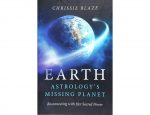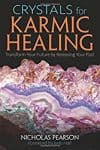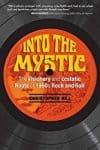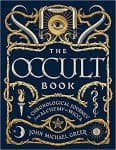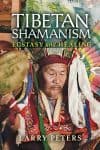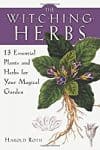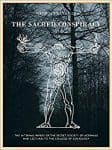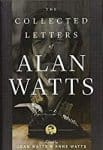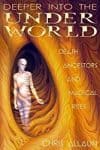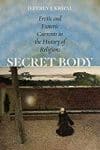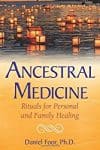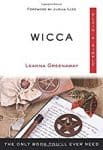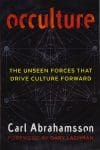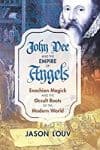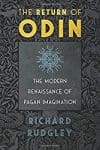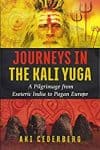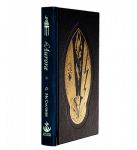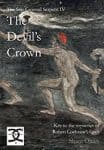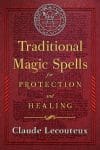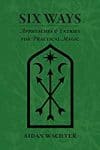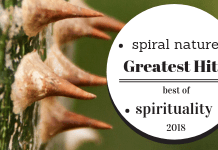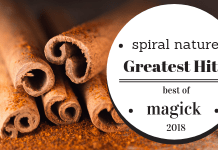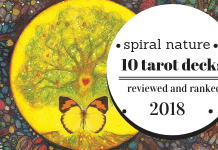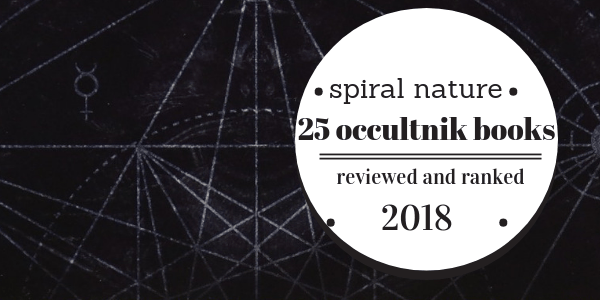
Looking for a new book on magick, spirituality, or occulture either for yourself or a friend?
Spiral Nature Magazine published 109 reviews of books and tarot decks in 2018, and we thought it might be handy to share the 25 most popular book reviews.
Each item on this list has a handy Amazon link if you’d like to purchase the book directly. Each direct purchase helps pay our writers and editors, so if you’re going to be purchasing from Amazon anyway, maybe click one of these links when you do?
Enjoy! And thanks for your support!
25. Earth: Astrology’s Missing Planet, by Chrissie Blaze
Reviewed by Alanna Wright
While astrologers have long studied the influence of celestial bodies on human events, these studies have neglected to take into account the energies of the planet we live on. In this paradigm-shifting book, Earth: Astrology’s Missing Planet: Reconnecting with Her Sacred Power, Chrissie Blaze emphasizes the importance of considering Earth when working with astrology, and provides a fascinating method for incorporating Earth into the astrological interpretation of birth charts. She also brings awareness to the pressing need for human reconnection to Earth in order to shift from the destructive conditions in our world being manifested through ecological crises.
24. Crystals for Karmic Healing, by Nicholas Pearson
Reviewed by Sharon Woods
The instant I saw the title of Crystals for Karmic Healing, I was intrigued. Crystals are one of my favourite areas of magick, and I’ve certainly been feeling like my circumstances or karma have been blocked for a while. This book offered the chance to learn more about the workings of karma and crystals, including how to use crystal grids, something I’d come across in passing, but never stopped to explore.1
23. Naked Witch, by Fiona Horne
Reviewed by Alanna Wright
Lead singer of the Australian band Def FX and public witch Fiona Horne has released her latest book The Naked Witch: An Autobiography. In this tell-all memoir, Horne goes through her life from childhood to present time, documenting the ups and downs of her journey. Rarely holding back, Horne gives the reader an up close and personal lens into the poignant moments behind her very public life.
22. Into The Mystic, by Christopher Hill
Reviewed by Alanna Wright
It has long been questioned whether the times shape the music or the music shapes the times. In his book Into The Mystic: The Visionary and Ecstatic Roots of 1960s Rock and Roll, Christopher Hill delves into the interplay of mindset, mood, and music as he goes into fascinating detail about the ways in which the greatest pop musicians of the 1960s were influenced by the spiritualmystics, revolutionary forces, and ecstatic revelation of times passed. Hill uses this inspiration to bring liberation and a new sense of consciousness to the masses, and brilliantly weaves together an intricately thorough and far out visionary perception to reframe our understanding of the vitality that was constellated by the music of the 1960s.
21. The Occult Book, by John Michael Greer
Reviewed by Daleth West
John Michael Greer’s latest book, The Occult Book: A Chronological Journey from Alchemy to Wicca, isn’t quite what I expected, but I can file it under “happy surprises” on my bookshelf. I must first acknowledge what a lovely volume it is. The publisher is Sterling, and the book is of beautiful quality — from the navy cover with embossed metallic gold designs, to the proliferation of artwork within and the satisfyingly heavy paper — it’s a delight to handle and read.
20. The Way of the Lover, by Ross Heaven
Reviewed by Marjorie Jensen
After reading a few books of Rumi’s poetry and developing my trance dance practice by exploring Sufi ecstatic dance techniques, I was intrigued by Ross Heaven’s use of the shamanistic medicine wheel as a way to understand Sufism. His blending of western and eastern spiritual practices is rather Jungian, and also prevalent in Joseph Campbell’s talks on the relationship between the Sufi and Arthurian religions of love.
19. Tibetan Shamanism, by Larry Peters
Reviewed by Kalagni
When most people think of Tibet, they think of Buddhism and His Holiness the 14th Dalai Lama. Despite being a predominantly Buddhist country for the last twelve hundred 1,200 Buddhism has coexisted, often violently, with a shamanic tradition as well. Tibetan Shamanismis an anthropologist’s work based on decades of study and first-hand experience living with these shamans. The book covers the history, theory, and living traditions of Tibetan shamanism in an academic manner that’s still easy to read and filled with personal stories.
18. Pop Culture Magic Systems, by Taylor Ellwood
Reviewed by Alanna Wright
Taylor Ellwood has written about pop culture magick for the past decade. His first two books on the subject, Pop Culture Magickand The Pop Culture Grimoire, were released in 2008, followed up with Pop Culture Magic 2.0and The Pop Culture Grimoire 2.0 in 2015. He also published Multi Media Magicin 2008 in the interim. Pop Culture Magic Systemsis a culmination of his work that builds off these previous publications and aims to provide a guidebook for readers to create and sustain their own pop culture magick systems.
17. The Witching Herbs, by Harold Roth
Reviewed by Laura Gyre
As a witch, I’ve always felt that I should have a way with plants, but growing them (or even keeping them alive) has never been as easy as I’ve hoped. In theory, it’s incredibly simple — if you put some seeds in the ground and water them, especially in the spring, some of them will start to grow. In practice that’s often true, but unfortunately that’s the easy part. Still, I keep trying. I hear there are lots of benefits to growing your own food and herbs and, if you believe in the wisdom and power of plants, it makes sense that there would be benefits. If you’re not convinced already, Harold Roth makes a pretty good case for learning to do it in The Witching Herbs: 13 Essential Plants and Herbs for Your Magical Garden. You can learn a lot about a plant’s personality and powers by studying the way it grows and behaves in a more or less natural habitat. Though, of course, there are other benefits to growing your own plants, like being sure of the quality and source of your herbs.
16. Sacred Conspiracy, edited by Marina Galletti and Alastair Brotchie
Reviewed by Mark Jones
It’s March 1937, and in the Forest of Marly near Paris, where a group of initiates meet under cover of darkness beneath a lightning-struck oak. These are the members of Acéphale, a secret society whose tight-lipped participants left scant clues as to what this whole clandestine affair was about — until now. Chief amongst them, and founder of the society, was Georges Bataille, philosophicaltheorist, novelist, anthropologist and, so it has been imputed, pornographer. Although Bataille has been described as “a vital figure in modern European thought,” he remains less well known than some of his illustrious contemporaries (and occasional adversaries) such as André Breton or Jean-Paul Sartre.1 To study Bataille’s work is to come up against uncompromisingly bold and transgressive concepts that can often seem bleak and disturbing, whilst at the same time revelatory. Bataille not only peers into the abyss of human experience, but readily plunges down into its murkiest recesses.
15. The Collected Letters of Alan Watts, edited by Joan and Anne Watts
Reviewed by Alanna Wright
Alan Watts (1915-1973), author of more than two dozen influential books, including The Way of Zen, The Wisdom of Insecurity, Become What You Are, and Out of Your Mind, was an acclaimed philosopher who helped bridge western culture and eastern consciousness. In a unique position of being a ZenBuddhist, ordained Episcopal priest, psychedelic advocate, and Guru, Alan Watts’ theological and philosophical insight spans the whole gamut of human nature, leading to his distinction as one of the greatest thought leaders of the 20th century. The Collected Letters of Alan Watts, a compilation of his letters written between 1928 and 1973 and edited by his two eldest daughters, Joan and Anne Watts, is filled to the brim with thought-provoking revelations that he wrote to his dearest confidants over the course of his life.
14. Deeper Into the Underworld, by Chris Allaun
Reviewed by Alanna Wright
Chris Allaun has released Deeper Into the Underworld: Death, Ancestors and Magical Rites as a follow-up to his first book Underworld: Shamanism, Myth and Magick.1 In this book, Allaun brings to life, or rather life after death, the powerful practice of ancestral spirit worship and highlights the immense spiritualbenefits that come from learning to commune with the deceased. The theme of death runs strong through the book yet Allaun has presented the material in such a way that allows the reader to open to the power of Underworld forces in much the same way as shamans, witches, and magicians have for countless centuries — with the knowledge needed to access this realm, courage to face the reality of death and wisdom to tap into the spiritual power of this domain.
13. Secret Body, by Jeffrey J. Kripal
Reviewed by Mark Jones
As someone new to the work of Jeffrey J. Kripal, I initially didn’t know what to make of this book. In the author’s own words, Secret Bodyis an “excessive, eccentric autobiography” that provides a panoramic sweep of his life and work as told through a succession of anecdotes, essays, lectures, and reviews. In effect, it feels like a crash course in Kripal’s spiritual and cultural beliefs with ideas, opinions, and commentary coming thick and fast. At the outset Kripal, who is a professor of philosophy and religiousthought, tells of how he identifies with Professor X of the X-Men, whose secret school of esoteric training is sought out by “mutants.” Like Professor X, Kripal also finds that “mutant souls seek [him] out”1 and claims there are “reports of strange experiences”2 from people who have read his books. At first, this made me wonder if he was, in fact, a narcissistic huckster who was taking this opportunity to brow-beat the reader with four hundred pages of (as Kripal later refers to it) “New Age woo woo.” Turns out that isn’t the case.
12. Ancestral Medicine, by Daniel Foor
Reviewed by Susan Starr
When I received and opened my long-awaited review copy of Ancestral Medicine: Rituals for Personal and Family Healing, I read the dedication: “Dedicated to all those working to protect and creatively renew ancient ways of life that respect the Earth and the many beings. May the ancestors guide us well through the ordeals that lie ahead.” That last sentence is the crux of the reason for doing ancestor work, and the reason this book is so necessary at this time as a manual for reconnecting. It’s the reason we turn to our living family in times of crisis as well as times of joy. They’ve experienced them before, and can give us priceless advice. And we need it now.
11. Wicca, Plain and Simple, by Leanna Greenaway
Reviewed by Daleth West
I was very excited to read Wicca, Plain and Simple. There is something so satisfying about a guide entitled, “The only book you’ll ever need” — especially when, as in this case, the volume is just 125 pages long. This isn’t to say I am credulous, only that I enjoy the idea that one book could cover a topic so authoritatively as to declare itself the only one needed. It turns out of course that the publisher has a whole series of volumes under the “only book you’ll ever need” tagline. So it’s worth noting that the reader of this book should pick it up with reasonable expectations — it’s not “the only book you’ll ever need,” it’s a primer about Wicca. After I read the book I thought about the idea behind the series, and it struck me that occultists aren’t typically people who are seeking the “only book” on any one topic — we tend to be people who love nothing more than many books, covering the minutiae of every facet of the corners of occult thought that interest us. I think this is probably true of Wiccans in particular, and witches in general.
10. Occulture: The Unseen Forces That Drive Culture Forward, by Carl Abrahamsson
Reviewed by Jo Bennett
Occulture: The Unseen Forces That Drive Culture Forwardis a collection of essays and lectures from Carl Abrahamsson that sets out to explore places where the magical bleeds into the cultural, influences it, and leaves it both changed and charged. Abrahamsson has been involved in magick since the ’80s. His biography describes him as a writer, publisher, magico-anthropologist, filmmaker, and photographer. He is the author of a previous collection of essays, Reasonances: Essays, Lectures, Interviews 2000–2013, and the editor of The Fenris Wolfa yearly anthology of occultural thought.
9. John Dee and the Empire of Angels, by Jason Louv
Reviewed by Daielth West
Jason Louv‘s new book, John Dee and the Empire of Angels: Enochain Magick and the Occult Roots of the Modern World, is a departure from his previous works. His other titles have pride of place in my occult book collection, and I’m a fan of his other work also, such as the Ultraculture blog and podcast, and his online magick school magick.me. He has a way of making really complex ideas accessible and has been instrumental in introducing modern magick including esotericism, Western hermetic magick, ceremonial and chaos magick to a younger audience.
8. Return of Odin, by Richard Rudgley
Reviewed by John Farrell
The Return of Odin, which bears a preface entitled “The Gathering Storm,” is bound to occasion a certain amount of nervousness, particularly given the subject matter. That being said, once I completed the book, this title makes perfect sense in its context. In this book, originally published Pagan Resurrection (Arrow, 2007), Richard Rudgley has created something remarkable — a book of great benefit and interest to academics, Heathens, and all those interested in currents of popular culture.
7. Journeys in the Kali Yuga, by Aki Cederberg
Reviewed by Alanna Wright
Aki Cederberg’s debut book, Journeys in the Kali Yuga, is a captivating and insightful memoir of a journey through initiation into the Naga Babas, Hindi Sadhu dedicated to a life of spiritual discipline and renunciation of worldly possessions, which ultimately leads him back to the roots of his homeland in a spiritual quest of fulfillment. His story offers a rare glimpse into eastern esotericism, which few westerns have the opportunity to peer into from the outside. Cederberg’s unique position as a westerner initiated into such a time-honoured Indian lineage as the Naga Babas gives him a fascinating perspective, as he juxtaposes and ultimately integrates the two vastly different yet intermingled spiritual heritages of eastern and western esotericism.
6. (h)Aurorae, by Gabriel McCaughry
Reviewed by Alanna Wright
(h)Aurorae by Gabriel McCaughry radiates with numinous energy. Unwrapping this book from the packaging, I could feel the solemn vibration of potent wisdom, the gnosis contained within humming. It was evident from the start that this book requires a certain care and preparation.
5. The Devil’s Crown, by Shani Oates
Reviewed by Marie RavenSoul
Most of us are familiar with the Abrahamic tradition surrounding the first-born son of Adam and Eve. After his sacrifice was rejected by Jehovah, Cain killed his brother, Abel in a jealous rage. He was cursed, given a mark, exiled and left to wander the earth. In The Devil’s Crown: Key to the mysteries of Robert Cochrane’s Craft, Shani Oates delivers further insight into this figure from the northern parts of the world. Readers learn about the tradition based upon the beliefs of Robert Cochrane, an English occultist and the founder of The Clan of Tubal Cain.
4. Traditional Magic Spells for Protection and Healing, by Claude Lecouteux
Reviewed by Donyae Coles
Magick has been around for a long time, longer than modern medical science, which explains why there’s such a large section of texts devoted to magically healing people. Traditional Magic Spells for Protection and Healing by Claude Lecouteux gathers noteworthy, if little known these days, practices from around Europe.
3. Sorcerer’s Screed, by Jochum magnus Eggertsson
Reviewed by John Farrell
All praise to the Icelandic Magic Company, for bringing this absolute gem of a book out of the shadows of subcultural obscurity and into wider availability. Sorcerer’s Screed The Icelandic Book of Magic Spells is highly unusual and tremendously entertaining, the product of the fevered polymathic brain of Skuggi (Shadow), who rejoiced in the given name of Jochum magnus Eggertsson. Skuggi tells us that he studied, among other things, rock collecting and cheese making, and actively pursued his own theory regarding the existence of an obscure Celtic tribe who roamed Iceland with a camel convoy. Readers take note: Sorcerer’s Screed is a journey into the mind and magical research of a prolific but wildly off-centre polymath. And what a journey this is!
2. Six Ways, by Aidan Wachter
Reviewed by Frater 232
Six Ways: Approaches & Entries for Practical Magic, by talismanic jeweller Aidan Wachter, offers readers a refreshingly nuanced take on contemporary chaos magick. The book presents the fundamentals of Wachter’s spirit-based approach to practical sorcery, while providing valuable insights drawn from the author’s experience. At 33 chapters, Six Ways covers a wide range of topics of interest to occultists, including servitors, offerings, the dead, dirt, dreams, breathwork, trance, sigils, talismans, and more. The text includes a large number of inspiring and open-ended exercises and rituals. Some exercises are aimed at beginners, but many will appeal to experienced practitioners, and the rituals can easily be used as written alongside others without causing undue dissonance.
1. Runes, by Teresa Drofn Freysdottir Njardvik

Reviewed by John Farrell
Once again, the Icelandic Magic Company has hit one out of the park. This time with a work of scholarship by the emerging Icelandic academic and poet, Teresa Drofn Freysdottir Njardvik. Simply put, Runes: The Icelandic Book of Futhark is the best and most complete contemporary resource on runes available in the English language. If you are in the English-speaking world and looking to learn about Nordic runes, look no further. You have found exactly what you need.
While we’ve reviewed a ton of books this year, we’ve by no means reviewed everything that’s come out.
If we’ve missed one of your faves, please let us know in the comments, and we’ll do our best to get one of our reviewers on it.


